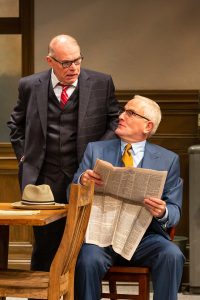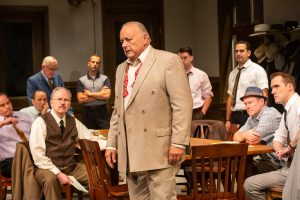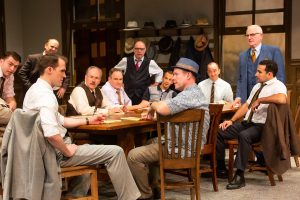
“Twelve Angry Men” – Courtesy of Zach Rosing. Used with permission.
In an age when our nation’s commander-in-chief maligns Mexican migrants as “rapists,” Black Lives Matter becomes a movement, a ban on Muslim immigration is imposed, White Nationalism increases, anti-Semitism re-emerges, opposing political parties are deeply polarized, and debate over what constitute “facts” exists, the iconic courtroom drama, “Twelve Angry Men,” has a relevance that is chilling. Written by Reginald Rose, the work first appeared in 1954 as a teleplay broadcast live on CBS’s Studio One anthology series. In 1957, a film adaptation starring Henry Fonda was released. Later, a stage version debuted on Broadway in 2004. Kicking off the Indiana Repertory Theatre‘s 48th season, the play opened Friday on the OneAmerica Mainstage and continues its run until September 29.
The play opens with 12 (white) men standing in a line as they listen to a judge’s instructions to render a verdict in a homicide trial. Initially, they reach a nearly unanimous decision of guilty, with a single objector voting not guilty, who argues there is reasonable doubt throughout the play. As is customary in the American justice system, the jurors must reach a unanimous verdict or concede to a “hung jury” status, resulting in a mistrial. They’re also informed a guilty verdict will result in a mandatory death sentence for the accused. The case they are deciding involves a young man, whose ethnicity is never mentioned, but is clearly a member of a minority group, who allegedly murdered his father. The crux of the play is the obvious prejudice directed toward the defendant, based on his race, his troubled background and the personal biases of some the jurors informed by their own personal relationships. After hearing the judge’s instructions, the jurors, only known by their juror numbers, representing a variety of social classes, occupations and professions, are sequestered in a hot, airless room to deliberate and arrive at a verdict.

L-R Clay Spindle & Henry Woronicz – Courtesy of Zach Rosing. Used with permission.
Playing out in a real time, Rose’s well-constructed script, featuring some of the finest dialogue ever written and making it seem as if more time has passed than actually does, takes place within the show’s one hour and 40-minute length without intermission. Expertly directed by IRT’s playwright-in-residence James Still, the play is so totally absorbing that time simply flew by. At one point, I purposely glanced at the audience to assess their reaction and saw everyone in the full house was as riveted as I was on the tension-packed proceedings.
The seasoned cast of actors included some based in Chicago and New York. Mixed with others well- known locally, each turned in distinctive and convincing performances, and were marvelous to observe working at their craft. Though I was caught up in their storytelling, I also enjoyed watching each actor’s character listening, reactions and responses to one another. Their depiction of this testosterone-infused pack of alpha males bickering, engaging in pissing matches and nearly coming to blows with one another was very realistic, thanks to Still’s astute direction. Here, indeed, was an ensemble of actors that interacted seamlessly to create an illusion.
Each character was seated at a conference table on a revolving platform that would occasionally turn full circle, allowing the audience to see the group from different angles throughout the play. This feature was an innovative contribution of set designer Junghyun Georgia Lee, who also designed the show’s befitting 50s-era costumes.
Shining in an impressive performance was Chris Amos as Juror #8, a thoughtful, gentle, cool-as-a-cucumber architect. Initially sympathetic to the 19-year-old defendant, he spends the entire play trying to convince his fellow jurors to practice patience and diligently analyze the details of the case, including the witness testimony which he feels is flawed. With the electric chair as the defendant’s fate and a reasonable doubt in his mind, he serves as the play’s protagonist, dedicated to ensuring that his fellow jurors don’t arrive at the wrong conclusion.

“Twelve Angry Men” – Courtesy of Zach Rosing. Used with permission.
On the opposite end of the spectrum is Juror #10, frighteningly portrayed by Robert Ierardi. His embittered, boorish and loud-mouthed character makes no secret of his prejudice as he spews forth a repugnant, racist tirade that shocks and disgusts his peers. Reminders of Charlottesville and the church shooting in Charleston, South Carolina came to mind in this scene, which illustrated the depth of racial animosity that still exists today in a society in which hate crimes are increasing.
Longtime IRT actor Mark Goetzinger gave a sympathetic performance as Juror #9, an aging man with a bleak existence who has given up on life. He is the first to change his mind after being convinced by Juror # 6 that there is not enough evidence to convict the defendant and the first to call Juror #10 on his racist beliefs.
Contrasting with the always-calm Juror #8 was Juror #3, played very effectively by Craig Spidle. Beset with anger and bitterness, his character believes the defendant is unquestionably guilty and reacts with combativeness when others disagree with him. At the heart of his opinion regarding the defendant is his dysfunctional relationship with his own son. His volatile attitude best represents the “angry” in the play’s title.
Michael Stewart Allen stood out as brash and obnoxious Juror #7, a slick salesman, who represents anyone who has even tried to avoid serving or has reluctantly sat on a jury. Obsessed with not missing a baseball game, he is determined to shirk his civic duty just to fulfill his own selfish desires.

“Twelve Angry Men” – Courtesy of Zach Rosing. Used with permission.
Finally, Henry Woronicz excelled in his characterization of logical, measured and articulate stockbroker Juror #4, who urges the other jurors to keep the discussion less emotional and more rational.
For those wishing insight into the physiological dynamics of toxic conflict that is occurring today between those asserting their white privilege and dominance over those who are marginalized and demanding power, there is no better window to peer into than Rose’s timeless creation. His play is a timely reminder that until categories such as “those people” and “they” are removed from the social equation, we will never live up to the promise in The U.S. Declaration of Independence that “All men are created equal.”
For tickets and information about “Twelve Angry Men,” call the IRT box office at (317) 635-5252 or visit irtlive.com.





